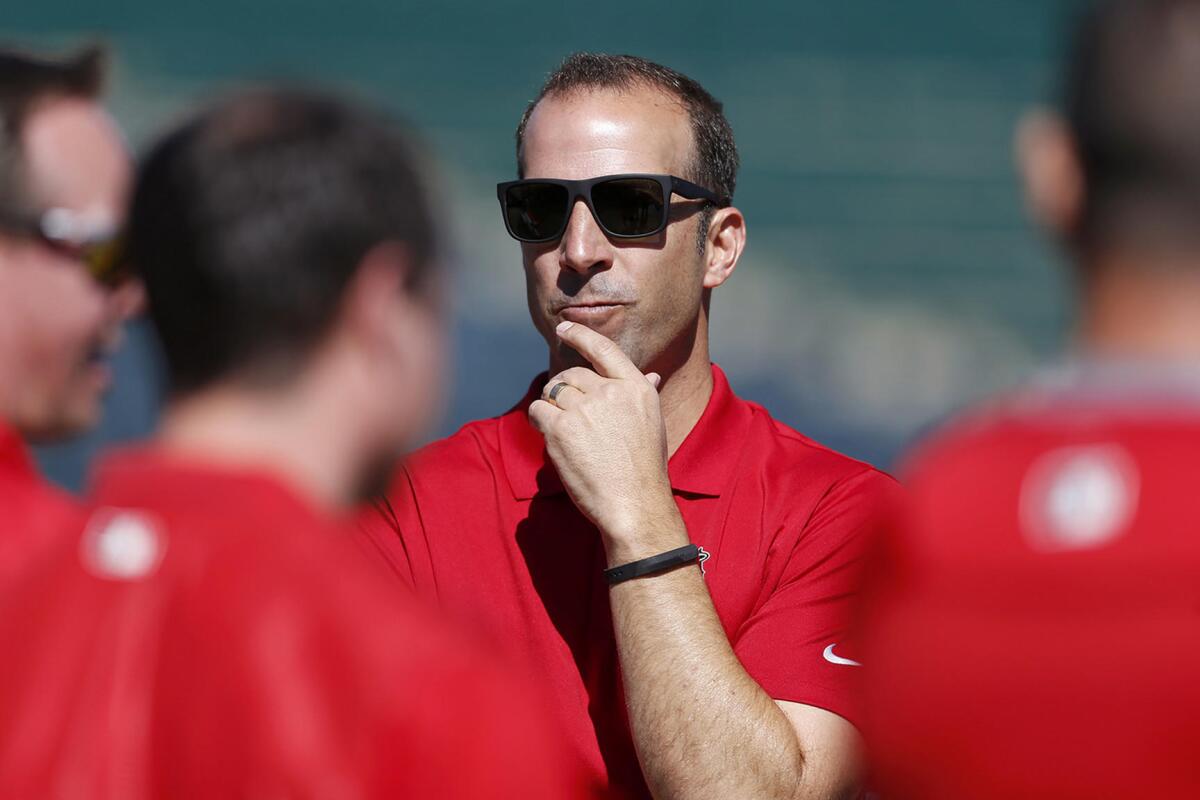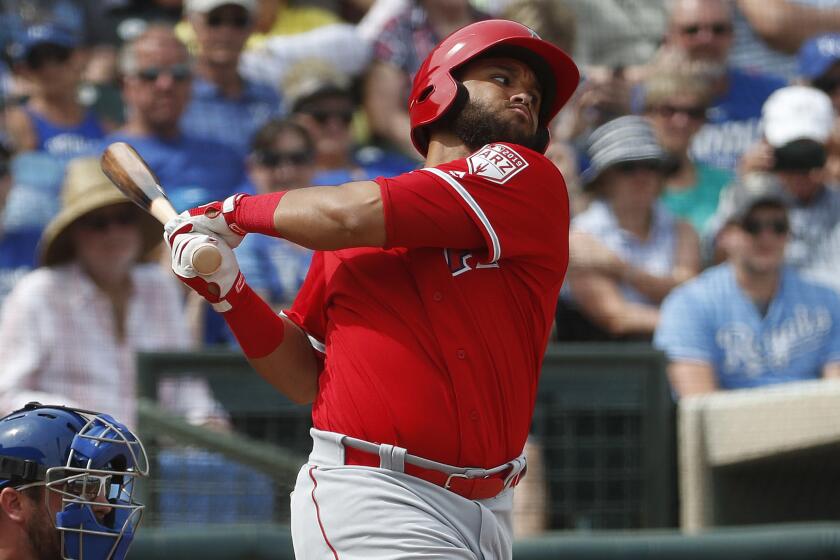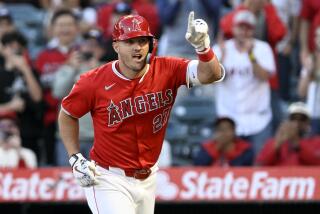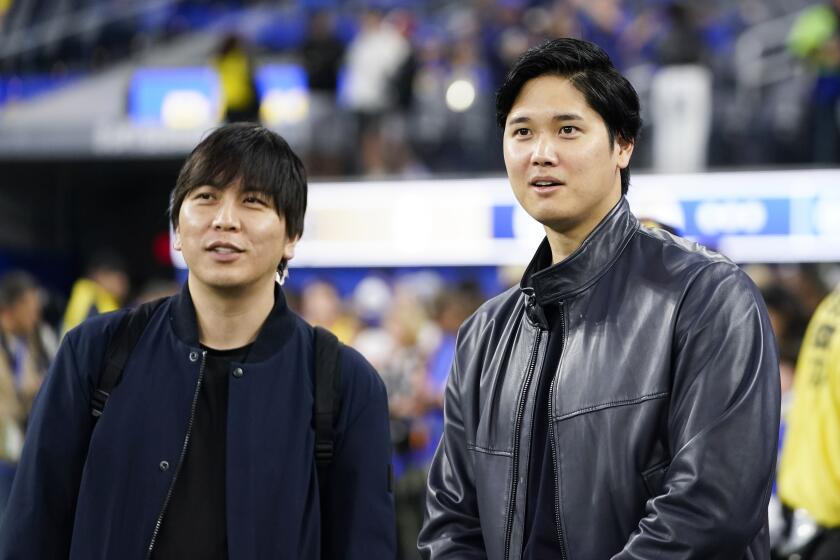Column: GM Billy Eppler has one year to turn Angels into a winner after four losing ones

The Angels didn’t know it then, but the best day of their 2019 season took place four days before it started.
Mike Trout basked in the raucous hollers from the fans assembled for a nationally televised news conference. The best player in baseball was about to begin his ninth season with the Angels. Free agency would have been two years away, and, with it, the chance to play wherever he liked. Instead, he had essentially committed the rest of his career to a team that last won a postseason game the year he graduated from high school.
Trout spoke of his respect for the Angels’ ownership and management, his camaraderie with his teammates and his appreciation for the Southern California weather. There was another factor too, the one that clinched his decision to stay.
“The direction of the franchise,” he said on that jubilant March afternoon. “That was big for me. If it was going the other way, I would have had to consider going. It never crossed my mind.”
Six months later, the direction of the franchise appears stagnant.
The Angels are on pace to win 75 games this season, after winning 80, 80 and 74 in the previous three. They last had four consecutive losing seasons from 1974-77, when the midseason managerial change was a rite during an Anaheim summer. In this era, as the power has shifted from the manager to the general manager, so too has the accountability.
MLB and the players’ union are expected to discuss whether to expand the major league drug testing program to include random screenings for opioids.
Billy Eppler has been the Angels’ general manager for all four of these losing seasons. He persuaded Trout to stay, and that alone ought to qualify his tenure as successful.
But, for Eppler, the time has come to win. The Angels last week told him he would return next year. They did not promise him anything beyond that.
Eppler inherited a major league team that had been eliminated from the playoffs on the final day of the 2015 season, and some organizational handcuffs.
Owner Arte Moreno does not believe in tanking, to his credit, so he directed Eppler to rebuild a minor league system ranked last by Baseball America without trading major leaguers to replenish the farm. That would have been challenging on the minor league level even without the league imposing spending limits on draft picks and Latin American amateurs, and challenging on the major league level even without free-agent resources impacted by the $375 million Moreno had invested in Albert Pujols and Josh Hamilton.
“You’re threading a pretty narrow gap there,” Eppler said.
By last winter, Eppler felt pretty good about the Angels. The farm system ranked among the top half in baseball. If the Angels didn’t push to win bidding wars for free-agent pitchers Patrick Corbin, Nathan Eovaldi and J.A. Happ, they could push this winter. In the meantime, a wave of kids would be just about ready — for the Angels, or for a trade that could net the Angels a long-term piece of their starting rotation.
“We made the conscious decision to pivot to one-year deals,” Eppler said. “We focused in that bin, knowing we would have an opportunity to stick that money back in our pocket.”
So he spent $34.35 million on one-year contracts for pitchers Matt Harvey, Trevor Cahill and Cody Allen, catcher Jonathan Lucroy and first baseman Justin Bour. He went 0 for 5. Eppler awarded his largest free-agent contract to infielder Zack Cozart, signed for $38 million after a career year with the Cincinnati Reds, then injured and ineffective in his two years in Anaheim.
Sign up for our free sports newsletter >>
In four years under Eppler, the Angels never have finished in the top five in runs or earned-run average. But they’re sixth in runs this year, even with left fielder Justin Upton missing half the season because of injury.
The 2020 outfield appears set: Upton in left, Trout in center and, probably, Jo Adell — ranked as baseball’s best outfield prospect — in right. Shohei Ohtani and Albert Pujols would share the designated hitter role, Andrelton Simmons would play shortstop, and the Angels would figure out the rest of the infield among Pujols, Cozart, Tommy La Stella, David Fletcher, and youngsters Luis Rengifo, Matt Thaiss and Jared Walsh.
“We feel like the answers can come from within there,” Eppler said.
Catcher appears to be a black hole. Eppler can patch a bullpen; closer Hansel Robles was claimed on waivers, and setup man Ty Buttrey was the trade return for two months of veteran Ian Kinsler.
That leaves the starting rotation. The Angels are about to become the first team in 100 years without even one pitcher making 20 starts in a season.
“I don’t think you would write out a shopping list that says, ‘Need three starting pitchers,’ ” Eppler said.
The Angels ought to think twice about that. Of the projected top three starters, Ohtani and rookie Griffin Canning are coming off injuries, and Andrew Heaney has yet to complete a season with the Angels without a stint on the injured list.
Eppler also hopes to hold one spot for a competition among Jaime Barria, Felix Pena, Dillon Peters, Patrick Sandoval and Jose Suarez. A championship-caliber team might be better off stocking all those guys as depth for when the starting five needs reinforcement.
That the Angels need arms is an all-too-common winter refrain, and so is the reliance on starting pitchers with a history of injury. What would Eppler tell Angels fans wondering why they should trust him to assemble a quality rotation this winter?
“With the emergence of our farm system, and players that will be contributing at the major league level, our number of needs in the free-agent marketplace will be smaller than in years past, which allows you to entertain a different caliber of player, in the free-agent market or in the trade market,” he said.
Jose Rojas, an Anaheim native who enjoyed a breakout season in the Angels’ farm system, will not play for the Angels this season, Brad Ausmus says.
“If you have six needs, it’s really hard to fill all of those in free agency. I can tell you our primary focus is going to be starting pitching.”
He paused, then repeated.
“Starting pitching,” he said.
Gerrit Cole, the Angels turn their lonely eyes to you, and their wallets too, stuffed with all the money they saved with those one-year contracts.
Cole turns 29 on Sunday. He is the undisputed ace of the free-agent class, a three-time All-Star, with three 200-inning seasons out of the last four.
He grew up in Orange County, so the Angels are his hometown team. It all sounds so perfect, until you remember all those Philadelphia fans that assumed Trout would sign with his hometown Phillies. And, assuming Cole wants to win, would he believe the Angels would be his best option?
Heaven forbid the Angels focus on Cole so intensely that Plans B, C, and D come off the board. Cole is represented by Scott Boras, who often advises his clients to wait deep into the winter. In 2010, the Angels went so hard after outfielder Carl Crawford that their fallback option turned out to be trading for Vernon Wells and his $86-million contract, and giving up slugging catcher Mike Napoli to do it.
The free-agent starting pitchers also include Madison Bumgarner, Dallas Keuchel, Jake Odorizzi, Hyun-Jin Ryu and Zack Wheeler. The Angels need more than one starter — Eppler says he needs two — and they have to be willing to overpay. Cole alone might cost $200 million.
When Moreno bought the Angels in 2003, he inherited Bill Stoneman as general manager and wisely retained him. When Stoneman retired, Moreno selected Tony Reagins, then Jerry Dipoto. Neither hire ended well, but each of those guys got four seasons and put up three winning records.
Eppler has one more chance, and likely one last chance, to put up one winning record.
More to Read
Go beyond the scoreboard
Get the latest on L.A.'s teams in the daily Sports Report newsletter.
You may occasionally receive promotional content from the Los Angeles Times.








